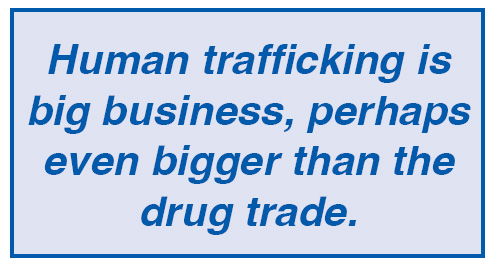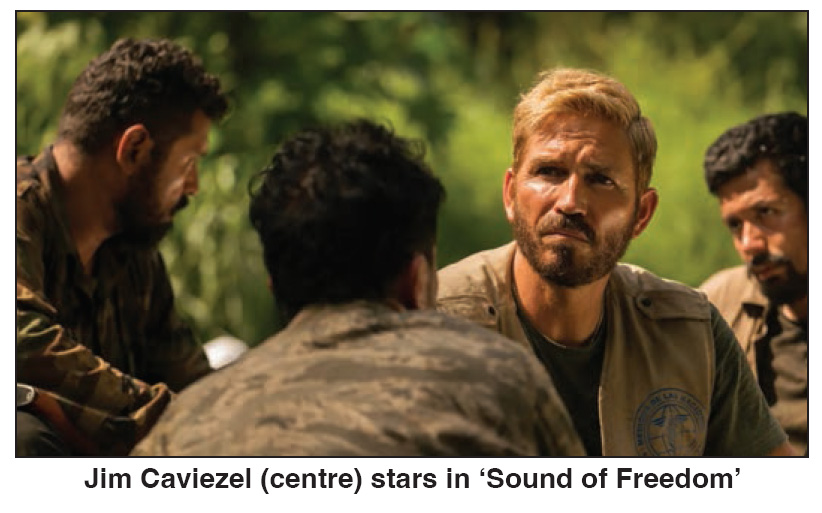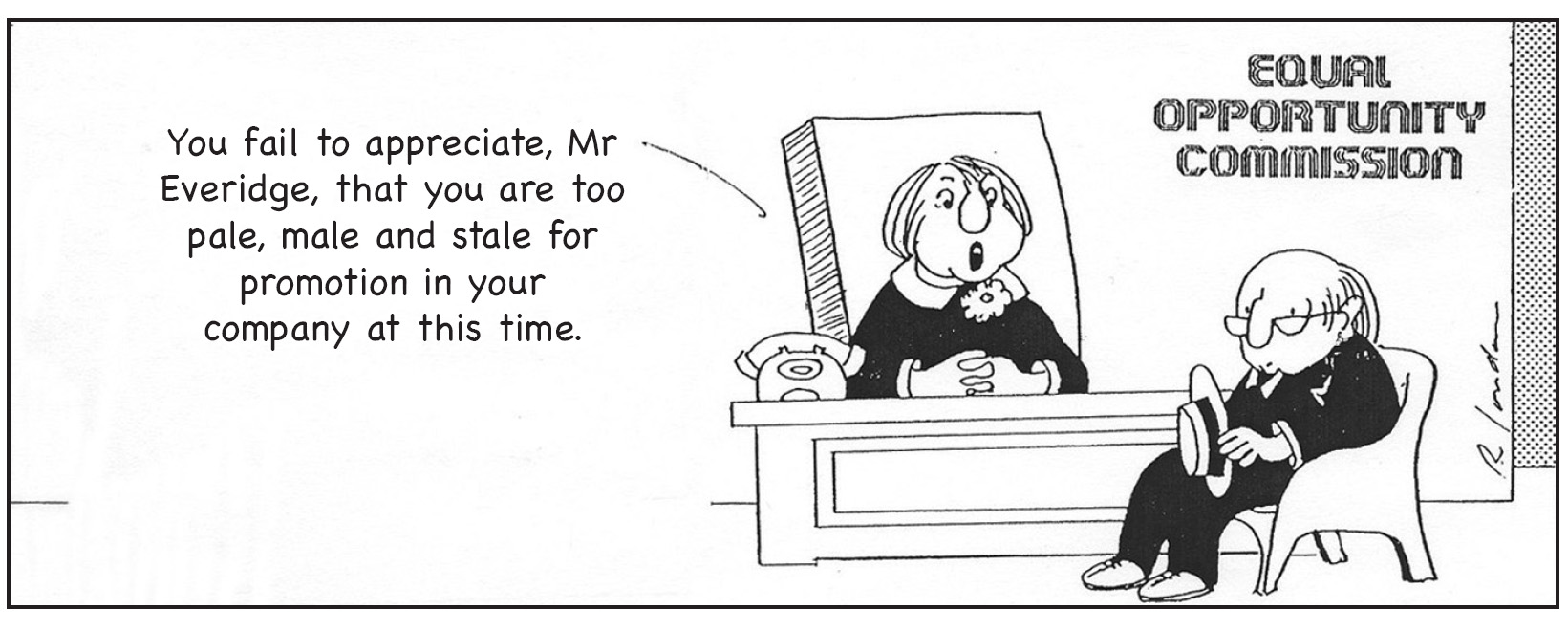
Confronting sex trafficking - A national and international struggle
 The summer's blockbuster movie Sound of Freedom, based on a true story of heroism about rescuing kidnapped children from sex traffickers, took America by storm and raised awareness of the horrors of sex trafficking. Sound of Freedom has brought in revenues of more than $US210 million.
Produced by Angel Studios, a small independent studio specialising in religious-themed movies, the film resonated with audiences who were sick and tired of "woke" movies produced by major film studios such as Disney.
The summer's blockbuster movie Sound of Freedom, based on a true story of heroism about rescuing kidnapped children from sex traffickers, took America by storm and raised awareness of the horrors of sex trafficking. Sound of Freedom has brought in revenues of more than $US210 million.
Produced by Angel Studios, a small independent studio specialising in religious-themed movies, the film resonated with audiences who were sick and tired of "woke" movies produced by major film studios such as Disney.
The movie is a gripping and inspiring story based on the life of Tim Ballard, a former U.S. Homeland Security agent. Starring Jim Caviezel, an actor best known for his roles in The Passion of the Christ and the television series Person of Interest, the film portrays two young Honduran children sold into sex slavery in Colombia.
At the end of the movie, Caviezel appears on camera urging the audience to encourage others to see the film and make it the Uncle Tom's Cabin of our age. Uncle Tom's Cabin, a novel written by Harriet Beecher Stowe in 1858, awakened many in the northern United States to the horrors of slavery; Sound of Freedom is intended to make the world aware of the business of child sex trafficking today.
Critics attack the film
Although rescuing children from sex traffickers should be uncontroversial, the film came under attack by the progressive press. Critics charged that the film presented a cult-like conspiracy theory promoted by groups such as QAnon. QAnon maintains that behind sex trafficking is a secret international, oligarchical cabal. Caviezel was accused of believing in a QAnon conspiracy theory. Caviezel denied knowing about QAnon when he was making the movie, and the director of the movie repudiated some of Caviezel's comments in the press indicating a somewhat conspiratorial view of the international sex trade. In any case, it is beside the point if an actor playing a part is a conspiracy theorist or not. What is clear is that Caviezel is a conservative Roman Catholic who opposes the very real evil of sex trafficking of children.
 Human trafficking is big business, perhaps even bigger than the drug trade. The U.S. State Department estimates that 27.6 million victims of human trafficking can be found in the world today at any given moment. Children and women are the main victims of this industry. A 2021 United Nations report found that the share of children among detected human trafficking cases tripled in the preceding 15 years. Sex trafficking is one form of human trafficking, which also includes labour trafficking, organ trafficking, child conscription and child marriage.
Human trafficking is big business, perhaps even bigger than the drug trade. The U.S. State Department estimates that 27.6 million victims of human trafficking can be found in the world today at any given moment. Children and women are the main victims of this industry. A 2021 United Nations report found that the share of children among detected human trafficking cases tripled in the preceding 15 years. Sex trafficking is one form of human trafficking, which also includes labour trafficking, organ trafficking, child conscription and child marriage.
Progressive complaints about the film came across as crass and oblivious to the real problem of child sex trafficking. The obvious question arose, "Why did the ultra-left respond with such hostility to the film?" The answer might be as simple as: it did not fit their progressive agenda of climate change, green energy, open borders and relaxed penalties for criminals.
In July, soft-on-crime Democrats in the California legislature actually blocked a bill that would have made child sex trafficking a "serious felony", raising the severity of the crime to the level of murder or rape. Public pressure and Governor Gavin Newsom subsequently changed some legislators' minds, and the bill is expected to become law.
The U.S.-Mexican border provides, as Kristen Ziccarelli pointed out in an op-ed in the Washington Examiner, "a mass channel for the smuggling of innocent women and children, many of whom are trapped in prostitution for the rest of their lives".
One dramatic scene in the film depicts a sex trafficker attempting to cross the border from Mexico with false documentation for a child. Ziccarelli concluded that the movie was attacked because "the modern-day left is unrivalled in its support of child sexualisation and demonisation of religious groups, especially Christians".
The American movie-going public seemed to ignore these controversies and went to the movie in droves. They came away understanding that sex trafficking is a major problem in the world, especially affecting the poor, the young and women.
'No. 1 human rights issue' A point made by some commentary is that most of the children who become sex slaves are not kidnapped, but carefully groomed and recruited online by skilful manipulators. Many of the children are lured into the sex trade by individuals and rings, often using the internet and social media. As one activist working with victims of sex trafficking in north Texas noted, "most of the time the trafficker not only knows the victim, but he or she has worked hard to groom him or her over long periods of time". Yet, kidnapping children for international trafficking undoubtedly happens.
A point made by some commentary is that most of the children who become sex slaves are not kidnapped, but carefully groomed and recruited online by skilful manipulators. Many of the children are lured into the sex trade by individuals and rings, often using the internet and social media. As one activist working with victims of sex trafficking in north Texas noted, "most of the time the trafficker not only knows the victim, but he or she has worked hard to groom him or her over long periods of time". Yet, kidnapping children for international trafficking undoubtedly happens.
Human trafficking survivor Bishop Donna Hubbard publicly defended the film from its critics by going on Fox & Friends Weekend to tell of her experiences as a victim and praise the film's message. She said that human trafficking is "the number one human rights issue in the world, in our generation and in our time". She astutely observed that "We have to really identify all forms of human trafficking, and those include involuntary organ donors, sex, sexual exploitation and, of course, pornography. But we also have to look at child soldiers, child brides."
However much critics decried Sound of Freedom, the movie struck a chord with the public. The media began reporting on international and domestic sex trafficking. In Washington, DC, Senate Republicans linked the problem to the Biden administration's border policies. All 49 Republican senators signed a July 27 letter calling for Senate hearings, citing an estimated 14,500 to 17,500 human trafficking victims entering the U.S. each year.
Human trafficking for labour, sex and other purposes is an international problem. Reliable statistics are elusive, but the International Labour Organisation estimates that 1.2 million children are trafficked annually. The United Nations Global Initiative to Fight Human Trafficking reveals that 20 percent of sex trafficking victims are minors, of whom 80 percent, as might be expected, are female.
Sex trafficking affects all countries. The problem is most prevalent in developing countries. Among other challenges, the cultures of some of these societies allow the selling of children into marriage.
Sex trafficking of children involves more than just prostitution. The exploitation of children in pornography is a similarly large problem. The United States is a major market for child pornography. As Patricia Holbrook, a victims' rights activist, noted in an op-ed in the Atlanta Journal-Constitution, the demand for child pornography reveals "an underlying spiritual factor at play — a deep moral corruption that fills our society".
Global efforts and failures since 2000
Human trafficking, whether for sex or labour, is growing, even after the international community organised twenty years ago to combat it. In 2000, the United States passed the landmark Trafficking Victims Protection Act. Since then, experts agree that progress has stalled on achieving the international community's goal articulated in the United Nations Sustainable Development Goal to end modern slavery among children by 2025, and universally by 2030.
The rot of human trafficking is not limited to populous states on the U.S. perimeter. In the heartland state of Missouri, 327 trafficking victims were confirmed in 2021 alone, according to the National Human Trafficking Hotline.
Every year on July 30, the United Nations recognises July 30 as World Day Against Trafficking in Persons, but human trafficking continues to increase. A U.S. State Department report released in June 2023 examined human trafficking violations in 188 countries and territories, as well as the "extent of government efforts" to meet standards set out in the Trafficking Victims Protection Act.
The report names the 21 worst countries failing to address human trafficking, involving mostly forced labour, and in some nations forced early marriage. For example, China is listed as one of the worst offenders because it shows a pattern of "widespread forced labour" including mass detentions of Uyghurs, ethnic Kazakhs, ethnic Krygyz, and members of other ethnic and religious minority groups.
Countries such as Eritrea, Burma, North Korea and Turkmenistan were found to have a pattern of forced labour. Of the 21 worst countries failing to enforce laws against sex trafficking, especially of children, Venezuela stood out for human traffickers recruiting migrants, particularly women and young girls, into "trafficking networks by using false promises of safe migration". Venezuelan women and girls coerced into sex slavery have been identified in 24 countries over the last five years.
 Federal law enforcement agencies, national and state legislatures, and activists have mobilised to fight sex trafficking in the United States. Child sex trafficking has been especially targeted. The suppression of sex trafficking involves breaking up prostitution rings, pornography operations and human smuggling at the border.
Federal law enforcement agencies, national and state legislatures, and activists have mobilised to fight sex trafficking in the United States. Child sex trafficking has been especially targeted. The suppression of sex trafficking involves breaking up prostitution rings, pornography operations and human smuggling at the border.
U.S. mobilisation
Following the public response to Sound of Freedom, the Senate Republicans' letter calling for hearings blasted the current administration's border policies for "facilitating the multi-billion-dollar business model of some of the most evil people on the planet". They noted that more than 1,300 investigations opened in fiscal year 2002 by Immigration and Customs Enforcement and Homeland Security Investigations have led to a 50 percent increase in trafficking-related arrests.
The flood of illegal immigrants to the U.S. has fuelled both child labour trafficking and child sex trafficking. In fiscal year 2021, there were approximately 1.7 million migrant encounters.
The following year, the number of encounters increased to 2.4 million. This year new records are being set. Lawmakers are especially concerned about the surge in unaccompanied children, who are vulnerable to exploitation by traffickers.
Homeland Security has targeted online sex trafficking. As one special agent in Homeland Security Investigations working in the Seattle area told the press, "It's a game of cat and mouse. Once we find one, we shut it down. Creators open up another one under a different name."
The agent used as an example a recently arrested suspected child sex trafficker who used two websites "prominent in the greater Seattle area". These sites were used to solicit sex with young underage females. Following the arrest, police found a 15-year-old victim at the Courtyard by Marriott hotel in Bellevue, who was being forced to have sex with clients. Ads were posted on a website stating that the young girl would have sex with anyone for money.
Numerous arrests and rescues
The FBI conducted a nationwide operation, Operation Cross Country XIII, in August 2023 that led to the identification or arrest of 126 suspects of child exploitation. The national raid found 200 victims of sex trafficking, including 59 missing children. This FBI operation involved the National Center for Missing and Exploited Children and Operation Cross Country, two organisations focused on identifying and locating victims of sex trafficking.
In Florida, Operation Cross Country found that 40 percent of the people arrested for trafficking were in the U.S. illegally. Seven of the 19 arrested in Bay County, Florida were illegal immigrants. Of those arrested, 14 were charged for traveling to engage in sexual activity with a minor; another five were arrested for possession of child pornography. Their mugshots were publicly released.
 News reports of other community efforts to crack down sex trafficking appeared across the country. In Cumberland, Pennsylvania, five massage parlours used as places for prostitution were closed when the owner was arrested for human trafficking. This operation was part of a Closed2Trafficking operation involving 12 federal, state and local agencies.
News reports of other community efforts to crack down sex trafficking appeared across the country. In Cumberland, Pennsylvania, five massage parlours used as places for prostitution were closed when the owner was arrested for human trafficking. This operation was part of a Closed2Trafficking operation involving 12 federal, state and local agencies.
In Chattanooga, Tennessee, the state Bureau of Investigation nabbed five men allegedly involved in human trafficking, one involving a special education teacher at a local elementary school. Other local newspapers reported on similar raids.
These raids, along with Sound of Freedom, brought national attention to the extent of child prostitution and child pornography in America. Child sex trafficking was in the news this year. It should have been earlier. In 2018 over half of all active criminal human trafficking cases in the U.S. involved child sex cases. Most of these children are recruited online. On average, they enter the sex trade at 12 to 14 years of age. Many are runaway girls. Most are trafficked by someone they know, a friend, family member or romantic partner. Many of these children find themselves having sex 20 times per day, six days a week.
Other children are coming across the border in what is estimated to be a multi-billion-dollar industry. In just May of 2023, U.S. Customs and Border Protection encountered an average of 435 unaccompanied minors per day. It is believed that drug cartels and traffickers exploit these children in prostitution, forced labour and child pornography. To worsen matters, in June the Biden administration released 344 kids to non-related adults.
Children deserve protection
As Christians in a fallen world, we know that evil exists and must be resisted. Exploitation of children is especially hard to bear. Every child freed from coerced sex or labour is a life saved from degradation. We should celebrate the successes.
We support criminal prosecution of those who exploit children. We support federal, state and local law enforcement agencies spending resources to crack down on child exploitation. We do not believe prostitution or pornography is a "victimless" crime. Our border should not be a highway for drug cartels to bring drugs, prostitution, child sex trafficking and coerced labour into the country.
We pray for these children, while our hearts cry out for their suffering.
This article is published by the Cardinal Mindszenty Foundation in St Louis, Missouri, USA. The original article, complete with references and footnotes, is available from the foundation's website: www.mindszenty.org. The Mindszenty Report is not copyrighted, and readers are invited to forward copies to their local bishops, priests and pastors. ![]()

